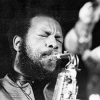Ornette Coleman

Ornette Coleman
Randolph Denard Ornette Colemanwas an American jazz saxophonist, violinist, trumpeter, and composer. He was one of the major innovators of the free jazz movement of the 1960s, a term he invented with the name of an album. Coleman's timbre was easily recognized: his keening, crying sound drew heavily on blues music. He was awarded a MacArthur Fellowship in 1994. His album Sound Grammar received the 2007 Pulitzer Prize for music...
NationalityAmerican
ProfessionSaxophonist
Date of Birth9 March 1930
CityFort Worth, TX
CountryUnited States of America
After I found out that I was playing music and that I'd have to learn how to read and write music, I started doing that about two years later. Finally, I said, "Oh, that means what I really want to do is to be a composer." But when I was coming up in Texas, there was segregation. There was no schools to go to. I taught myself how to read and how to start writing.
It seems the activity of expressing sound to do with music has just started blooming - and because of that, the beginners feel like they're professionals, and the professionals feel like they are beginners, which is very healthy.
Jerry Garcia was one of the original American icons. He played naturally and beautifully.
Sound has no parents.
I don't really live like a musician myself. I think music is just something that I do, but I'd like to be doing lots of other things. I like to cure all kinds of illness.
I wasn't so interested in being paid. I wanted to be heard. That's why I'm broke.
To me, human existence exists on a multiple level, not just on a two-dimensional level, not just having to be identified with what you do and what you say.
It's just someone has labelled us as having a different label to do what you do. I find that labels are the worst thing in the world for artistic expression.
I'm having this conversation with you now. I'm talking, but I'm thinking, feeling, smelling, and moving. Yet I'm concentrating on what you're saying. So that means there's more things going on in the body than just the present thing that the person's got you doing.
I had a really good time in New Orleans, although I had some very tragic times in Baton Rouge. Some guys beat me up and threw my horn away. 'Cause I had a beard, then, and long hair like the Beatles.
Musicians tell me, if what I'm doing is right, they should never have gone to school.
All the things that human beings suffer from are how their environment treats them, and how the elements of their planet affects their mind and body - like radiation, cancer, and all.
After I left Texas and went to California, I had a hard time getting anyone to play anything that I was writing, so I had to end up playing them myself. And that's how I ended up just being a saxophone player.
Even when you write it, someone's got to play it. So if you can play it and bypass all the rest of the things, you're still doing as great as someone that has spent forty years trying to find out how to do that. I'm really pro-human beings, pro-expression of everything.